Marian Anderson appeared with the Chicago Symphony Orchestra and in recital in Orchestra Hall on numerous occasions between 1929 and 1968.
Carl Van Vechten, 1940 (Beinecke Rare Book & Manuscript Library, Yale University)
In February 2022, we celebrate the 125th anniversary of the birth of the great American contralto Marian Anderson. She was born in Philadelphia on Feb. 27, 1897, and died in Portland, Oregon, on April 8, 1993, at the age of 96.
On Nov. 18, 1929, Marian Anderson (under the management of Arthur Judson) made her debut in Orchestra Hall under the auspices of the Theta Omega chapter of Alpha Kappa Alpha sorority. That evening, Anderson “reached near perfection in every requirement of vocal art,” wrote Herman Devries in the Chicago Evening American. “The tone was of superb timbre, the phrasing of utmost refinement, the style pure, discreet, musicianly . . . a talent still unripe, but certainly a talent of potential growth.” In attendance were Ray Field and George Arthur, representatives from the Rosenwald Fund, who encouraged her to apply for a fellowship to further her studies in Europe. The following year, she received $1,500 to study in Berlin.
In 1939, the Daughters of the American Revolution refused Anderson the opportunity to give a concert for an integrated audience in Washington, D.C.’s Constitution Hall. With the support of President Franklin D. and First Lady Eleanor Roosevelt, she instead performed on the steps of the Lincoln Memorial on Easter Sunday, April 9, 1939, to a crowd of 75,000 people and over a million radio listeners. Anderson closed the recital with the spiritual “My soul is anchored in the Lord” in an arrangement by Florence Price.
A few weeks later, on May 20, 1939, Anderson was scheduled to make her debut with the Chicago Symphony Orchestra at the North Shore Music Festival, in Evanston’s Dyche Stadium (now Ryan Field). The afternoon program was to include arias from Donizetti’s La favorita and Debussy’s L’enfant prodigue, along with spirituals, all under the baton of Frederick Stock. A case of laryngitis, however, prevented her from performing, and soprano Kirsten Flagstad, scheduled for the evening concert, was asked to fill in for the matinee. According to the Chicago Daily News, there was no time for Flagstad to rehearse the extra program with the Orchestra due to “a purely feminine” hesitation: she needed a different dress for the matinee. Festival organizers quickly took her to Marshall Field’s to shop for a second dress, and the concert, featuring several excerpts from Wagner’s operas, was “amply redeemed by the artistry of Mme. Flagstad,” according to Janet Gunn in the Chicago Herald and Examiner.

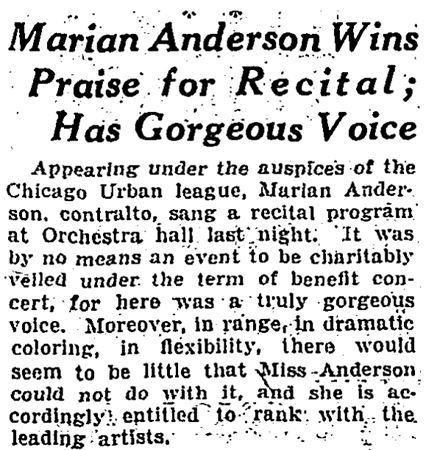
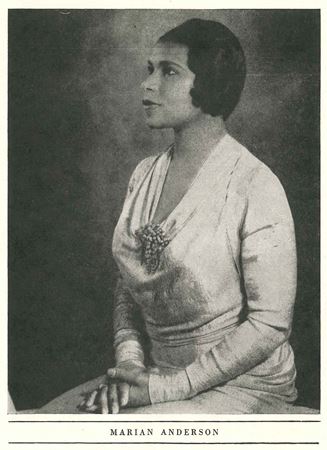
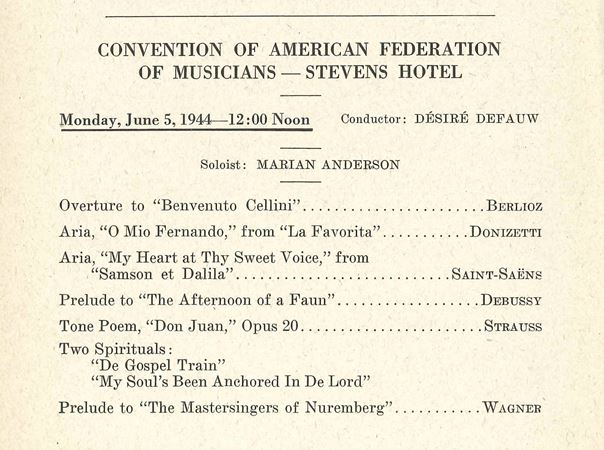
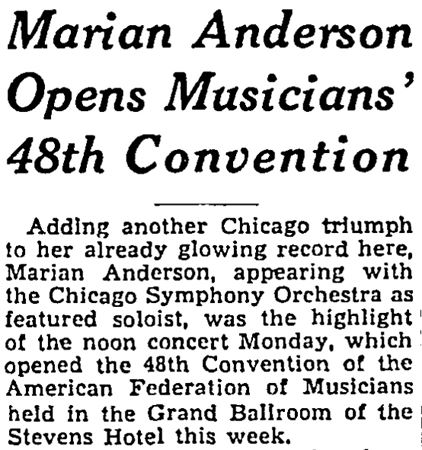
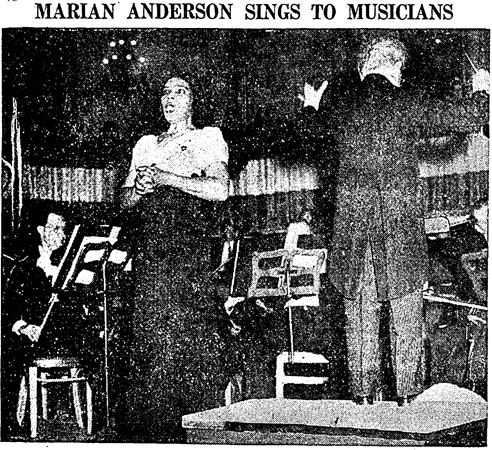
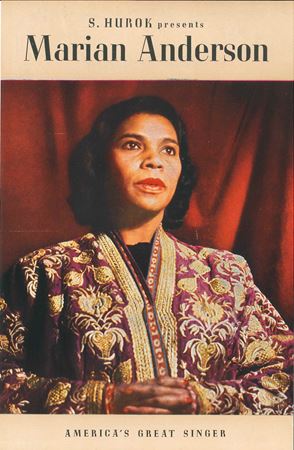
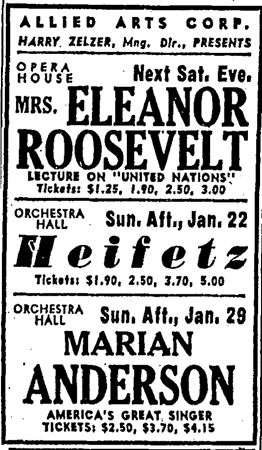
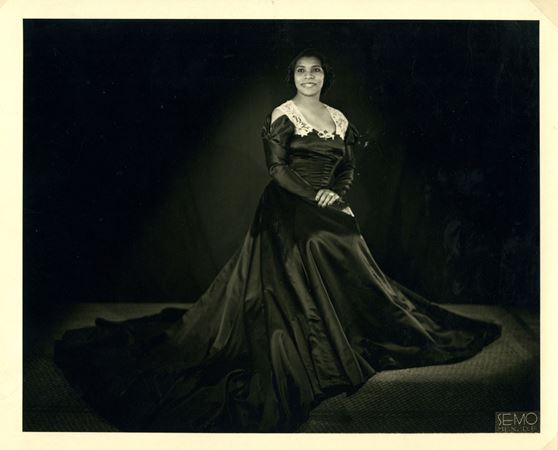
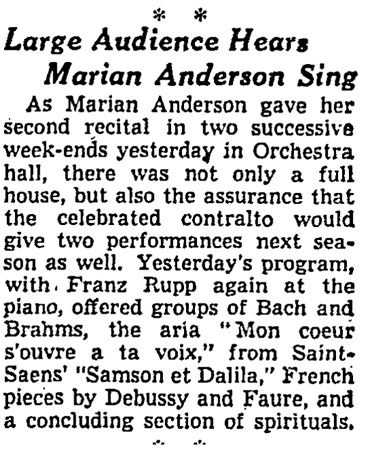
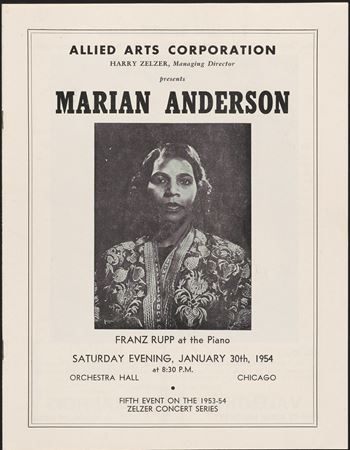
Her debut performance with the CSO was at a concert opening the 48th Convention of the American Federation of Musicians on June 5, 1944, at the Stevens Hotel (now the Hilton Chicago). Under third music director Désiré Defauw, she sang “O mio Fernando” from Donizetti’s La favorita, “Mon coeur s’ouvre à ta voix” from Saint-Saëns’ Samson and Delilah, and spirituals.
Anderson broke barriers on Jan. 7, 1955, when she made her debut at the Metropolitan Opera — in Verdi’s Un ballo in maschera as Ulrica — becoming the first African American to sing with the company. The following year, she opened the Ravinia Festival’s 21st season, along with the CSO under Eugene Ormandy in two programs, performing the following:
June 26, 1956
BRAHMS Dein blaues Auge, Op. 59, No. 8
BRAHMS Immer leiser wird mein Schlummer, Op. 105, No. 2
BRAHMS Der Schmied, Op. 19, No. 4
BRAHMS Von ewiger Liebe, Op. 43, No. 1
BRAHMS Alto Rhapsody, Op. 53 (with the Swedish Glee Club; Harry T. Carlson, director)
June 28, 1956
BIZET Agnus Dei
BIZET Ouvre ton coeur
SAINT-SAËNS Mon coeur s’ouvre à ta voix from Samson and Delilah
TCHAIKOVSKY None but the Lonely Heart, Op. 6, No. 6
TRADITIONAL IRISH Believe Me If All Those Endearing Young Charms
KREISLER The Old Refrain
According to Seymour Raven in the Chicago Tribune, a crowd of more than 4,000 attended the all-Brahms concert that “turned out to be perfect.” Anderson sang “introspectively and with tender regard [and] exceptional craftsmanship and feeling.”
On Aug. 28, 1963, Anderson performed “He’s got the whole world in his hands” at the March on Washington for Jobs and Freedom, at which Martin Luther King, Jr. gave his “I Have a Dream” speech.
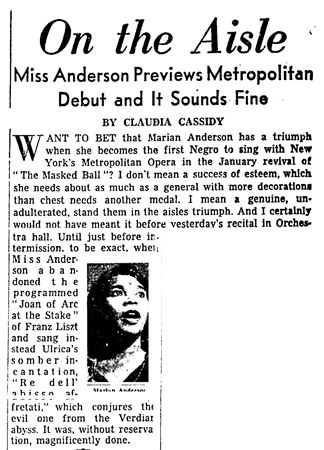
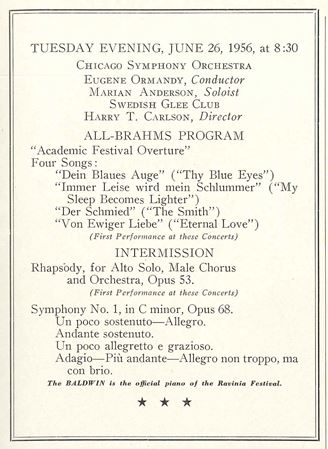
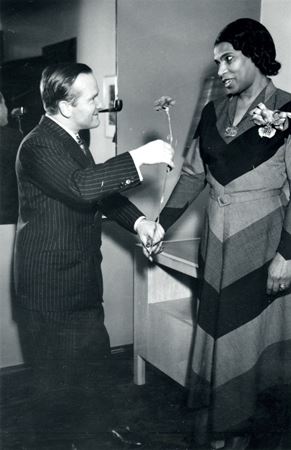
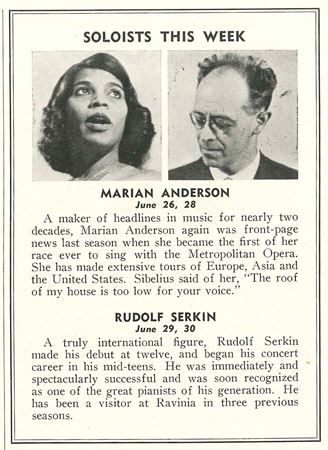
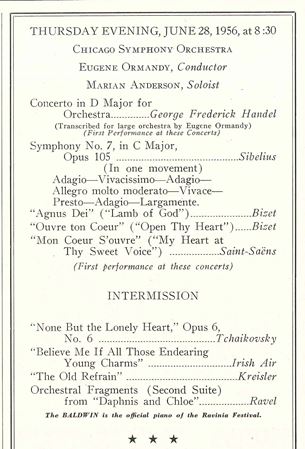
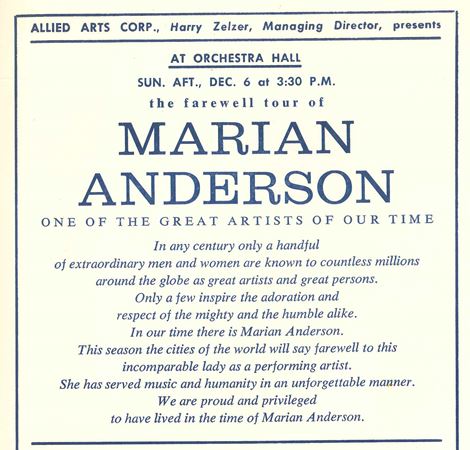
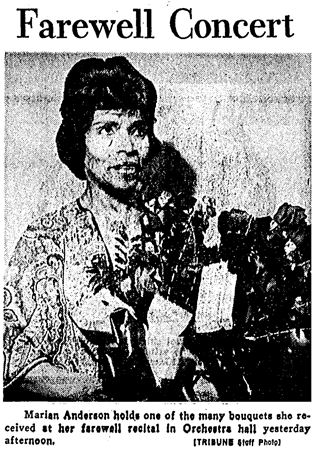
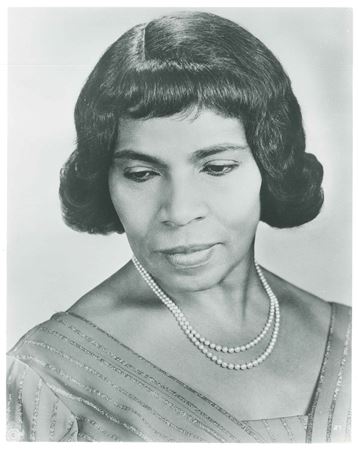
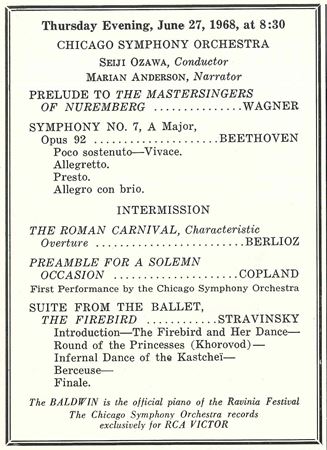
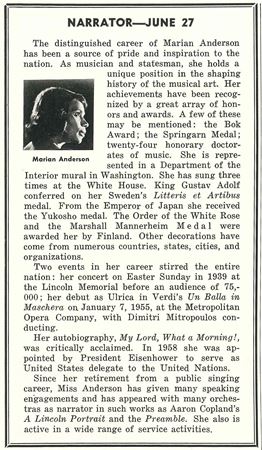
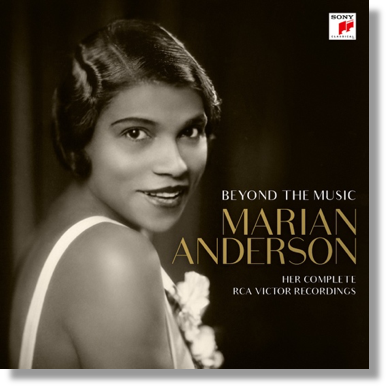
During the 1964-65 season, Anderson gave a farewell recital tour under the auspices of her longtime presenter, Sol Hurok. Her stop in Chicago’s Orchestra Hall on Dec. 6, 1964, was sold out (an additional 225 seats were onstage) and “well-wishers had also provided a red carpet, bouquets of red roses and white carnations by the armload,” according to the Chicago Tribune. “This is probably no time for sentiment,” Anderson commented. “But do let me say I find all of this today very touching.” Her encores included “There’s no hiding place down there” and Schubert’s “Ave Maria.”
On June 27, 1968, at Ravinia, Anderson made her final appearance with the CSO, as narrator in Copland’s Preamble for a Solemn Occasion. Festival music director Seiji Ozawa conducted. Reading the “stirring segment from the United Nations charter,” wrote Thomas Willis in the Chicago Tribune, Anderson was “radiant in a cherry red velvet cape [contributing] both the presence and conviction, which made her vocal performances such moving experiences.”
Anderson gave a total of 22 recitals in Orchestra Hall, as follows:
November 18, 1929
January 26, 1931
October 28, 1945
November 3, 1946
November 23, 1947
October 24, 1948
January 21, 1950
January 29, 1950
January 21, 1951
April 8, 1951
May 3, 1952
January 31, 1953
March 29, 1953
January 30, 1954
December 5, 1954
January 8, 1956
February 23, 1957
April 5, 1959
February 28, 1960
February 19, 1961
May 11, 1963
December 6, 1964
In September 2021, Sony Classical released Marian Anderson: Beyond the Music, a special 15-CD set of recordings representing her complete catalog on RCA Victor, from her debut in 1924 through her final LP in 1966. The set received a 2022 Grammy Award nomination for Best Historical Album.




